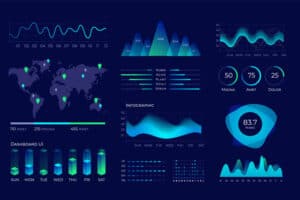The real estate industry is evolving rapidly, driven by advancements in digital technology and a growing demand for personalized user experiences. One of the most transformative innovations is the customizable MLS (Multiple Listing Service) dashboard tailored for power users—real estate professionals who require advanced tools, insights, and customization to stay competitive. This article explores how customizable dashboards are revolutionizing the real estate landscape.
Overview
This article breaks down the role of customizable MLS dashboards, their significance in today’s tech-driven real estate environment, and how they empower agents, brokers, and developers. We also explore integration with AI, analytics, remote work tools, and more, culminating in the ultimate tech ecosystem for power users.
Real Estate Development World
Developers are increasingly relying on tech solutions to identify prime locations, manage assets, and connect with investors. Custom dashboards allow developers to visualize zoning data, project timelines, and investor engagement metrics all in one place.
Private Real Estate Networks
Private networks offer off-market listing exchanges among select professionals. A customizable dashboard enables agents to integrate these networks, offering a single interface for managing both public and private listings.
Remote Real Estate Work
Remote work is now standard practice. Custom dashboards support this trend by consolidating CRM tools, video conferencing, document management, and lead tracking, making it easier for agents to operate from anywhere.
The MLS Concept
The MLS is a shared database where brokers list properties and collaborate. Modern MLS dashboards go beyond static listings, enabling dynamic views, saved searches, personalized analytics, and real-time updates.
Needed Training Courses
Training courses are essential to help agents utilize advanced dashboard tools. Courses in data analytics, CRM integrations, and digital marketing ensure users can fully leverage MLS functionalities.
Needed Certifications
Certifications like e-PRO, CRS, and CNE (Certified Negotiation Expert) are critical. They teach agents how to harness digital tools and negotiate more effectively using real-time market data.
Onboarding Programs for New Agents
Customized dashboards streamline onboarding by offering tailored workflows, integrated tutorials, and personalized checklists that help new agents understand MLS systems faster.
MLS Agent Onboarding Processes
The MLS onboarding process includes user account setup, compliance training, and an orientation on dashboard customization features. This ensures uniform data quality and ethical standards.
MLS Platforms
Platforms such as Flexmls, Matrix, and Cloud MLX are offering increasingly customizable features. Power users can now configure widgets, rearrange dashboards, and integrate third-party applications.
Optimizing MLS
Optimization includes enhancing load speeds, using automation for lead scoring, and integrating APIs for seamless CRM synchronization. These features help power users save time and improve productivity.
Artificial Intelligence
AI integration within MLS dashboards enables predictive modeling, sentiment analysis, and auto-generated listing descriptions. These capabilities help agents offer faster and more relevant services.
AI Matching Buyers with Ideal Neighborhoods
AI tools can cross-reference buyer preferences with neighborhood demographics, crime rates, school ratings, and commute times to suggest ideal areas. This is often visualized through customizable heat maps on dashboards.
Analytics – Economic Impact
Custom dashboards offer real-time analytics on home sales, average days on market, and price trends. These insights help agents and investors respond to market changes proactively.
Data Quality Management
Consistent and accurate data is the backbone of effective dashboards. Features like mandatory field checks, data validation alerts, and user feedback loops ensure high-quality entries.
Intelligent Listing Alerts Based on Market Movement
Agents can set smart alerts triggered by market shifts, like price drops or increased competition. These alerts appear directly on the dashboard or via mobile push notifications.
Data Security Standards
Custom dashboards must comply with standards such as SOC 2 and ISO/IEC 27001. Encryption, access control, and audit trails protect sensitive transaction data.
Sustainable Development Data
Custom MLS dashboards can display LEED certifications, energy scores, and solar readiness. This appeals to eco-conscious buyers and helps agents promote green properties.
Personalization Features
Power users benefit from drag-and-drop dashboard elements, custom themes, and saved searches. Role-based views allow brokers, admins, and agents to tailor their interface.
User Experience Design
Great UX is critical. MLS dashboards now feature responsive design, dark mode, keyboard shortcuts, and intuitive navigation, allowing users to access information with minimal effort.

Customizable MLS Dashboards for Power Users
These dashboards are designed for professionals who want total control. Features include:
- Customizable widgets (e.g., market stats, calendar, task manager)
- API integrations (e.g., Zillow, Salesforce, HubSpot)
- Multi-dashboard support (residential, commercial, rental)
- Advanced filters and segmentation
- Real-time collaboration tools
This level of customization turns MLS into a personal command center, increasing efficiency and performance.
Usability Testing
Frequent A/B testing and focus groups ensure features align with user expectations. Feedback-driven updates help improve retention and satisfaction.
Fix And Flip
Flippers use dashboards to track ROI, budget, and timelines. Integration with contractor ratings and renovation calculators provides a full project overview.
Property Valuation Tools
AVMs (Automated Valuation Models) and CMA (Comparative Market Analysis) tools are essential dashboard widgets. They provide instant valuations and pricing suggestions.
MLS Tools for First-Time Homebuyers
Dashboards offer educational modules, affordability calculators, and guided tours. Simplified interfaces reduce confusion and enhance buyer confidence.
Cross-Promotion Strategies in MLS
Power users employ dashboards to schedule and manage social media posts, email campaigns, and listing syndications across platforms like Trulia and Facebook Marketplace.
Avoiding Legal Trouble When Wholesaling Properties
Dashboards offer legal document templates, compliance alerts, and wholesaling checklists. These tools help users avoid illegal practices and maintain transparency.
Leads – Integrating Digital Marketing
CRM integrations allow users to track and nurture leads from Google Ads, Facebook campaigns, and email funnels. Dashboards display lead scoring and follow-up schedules.
Machine Learning Models
Machine learning enhances predictive analytics, fraud detection, and personalized content delivery. Dashboards display these insights in visual formats for quick decision-making.
Renewable Energy Integration
Listings with renewable energy features are flagged and filterable. Dashboards can prioritize these listings based on buyer preferences or policy incentives.
Process Improvement
Custom dashboards identify bottlenecks, automate redundant tasks, and streamline client communications. Workflow automation boosts overall operational efficiency.
Innovation Hubs
MLS vendors are establishing innovation hubs to co-create with users. Features like voice-enabled commands, AR property views, and blockchain integration are being explored.
Review and Reputation Systems
Integrated review systems for properties, agents, and service providers help build trust. Dashboards feature reputation scores and recent feedback summaries.
Venture Capital Investments
VCs are backing platforms with highly customizable features, AI, and mobile-first design. Funding accelerates development and expands feature sets for power users.
Business Model Innovation
Freemium models, usage-based pricing, and white-label MLS solutions are redefining monetization. Custom dashboards serve as a premium offering for top-tier users.
Market Trend Predictive Modeling
Dashboards use AI to forecast neighborhood growth, rental yields, and economic cycles. These insights help investors and agents make data-driven decisions.
Operational Efficiency Solutions
Custom dashboards centralize operations—integrating scheduling, lead tracking, analytics, and communication tools. This consolidation cuts down on tech bloat.
Professional Development
Ongoing education is accessible directly through dashboards via webinars, certification courses, and knowledge libraries. This supports lifelong learning.
Frequently Asked Questions
What is a customizable MLS dashboard?
It’s a user interface where real estate professionals can personalize tools, widgets, and data views according to their workflow needs.
Who are power users?
Agents, brokers, and developers who use MLS systems extensively and require advanced customization and analytics capabilities.
Can I use third-party tools with my dashboard?
Yes, many dashboards support API integrations with CRM, marketing, and valuation tools.
How does customization improve productivity?
It allows users to focus on key metrics, automate tasks, and streamline daily operations, reducing time spent switching between tools.
Are custom dashboards secure?
Absolutely. Most platforms adhere to industry security standards, offering encryption and user access controls.
Customizable MLS dashboards are no longer a luxury—they are a necessity for modern real estate professionals seeking efficiency, insight, and a competitive edge. By combining AI, analytics, UX design, and integration capabilities, these dashboards offer a one-stop solution for power users to dominate their markets. As technology advances and user expectations rise, customizable dashboards will become the cornerstone of successful real estate operations.










